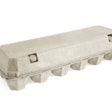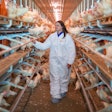
Some Utah state legislators think that 2025 is too soon to expect egg producing farms in the state to convert to exclusively using cage-free laying systems.
Utah Senate Bill 222, which would push back the deadline for which all producers must comply to 2030.
The state’s Senate Business and Labor Committee voted unanimously to advance Utah Senate Bill 222, which was sponsored by Sen. Michael K. McKell, R-Spanish Fork.
The law that McKell’s bill seeks to amend passed both houses and was signed by Utah Gov. Spencer J. Cox on March 17, 2021. The law presently reads that beginning on January 1, 2025, a farm owner or operator may not knowingly confine a laying hen in an enclosure that is not a cage-free housing system or that has less than the amount of usable floor space per hen as required by the 2017 edition of the United Egg Producers (UEP) Animal Husbandry Guidelines for U.S. Egg-Laying Flocks: Guidelines for Cage-Free Housing.”
The only change for that portion of the bill would be the implementation date.
However, the original bill also calls for the Utah Department of Agriculture and Food to provide a report to the business and labor committee that outlines the progress of all efforts to convert to cage-free production systems by November 2023. SB 222 pushes that deadline back to October 31, 2027.
Now that McKell’s bill has been approved by the committee, it advances to the full Senate. If it passes both houses and gets the governor’s approval, SB 222 would take effect on May 1, 2024.
According to a report from KSL, issues with the cage-free egg law emerged before the 2024 legislative session even began. Utah egg producers said they were investing millions of dollars to make the conversions, but most remained 50% to 75% compliant with the law at the time. McKell reportedly first proposed a 10-year delay in the implementation, but after consulting with other lawmakers and Utah egg producers eased back to a five-year delay.
Rep. Jefferson S. Burton, also a Republican from Spanish Fork, sponsored a House version of the bill.


















